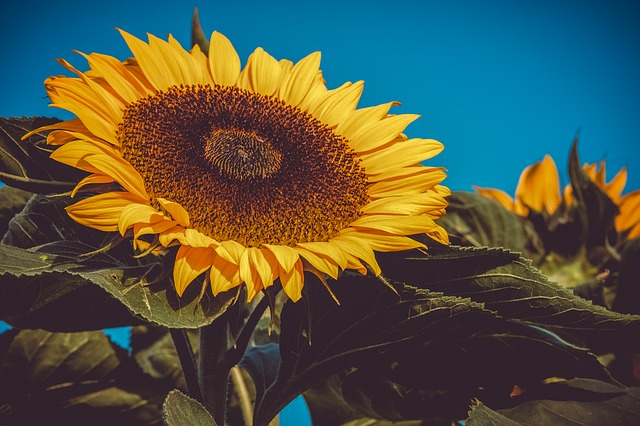 |  |  |     |  |
 |  |
Sunflower is an annual, erect plant, with a grooved and coarsely hairy stem, with lateral branches. Height from 80-250cm. The root system is peg-shaped, the roots grow up to 3m in the soil, in search of moisture. The plant has large, heart-shaped or ovate leaves with pointed ends, which are arranged alternately, serrated at a distance along the edge.
Light yellow to golden colored flowers are arranged in a large basket up to 50 cm in diameter, which is able to follow the sun (only the young plants follow the sun). Flowering begins at the height of summer - in July and continues for approximately one month.
At the end of August or at the beginning of September, the fruits began to ripen - elongated oval seeds, black or gray in color, or white with stripes. The plant is pollinated by wind and insects.
Sunflower likes neutral, nutritious, light soil and good lighting. The plant is thermophilic and suffers from frost. The seeds are sown in mid-April or May. As soon as the sprouts of the plant appear, the flowering phase began after 75-80 days.
Currently, there are many forms of sunflower breeding in the world, which are used as decorative garden plants - they are not used in medicine.
Ready seeds, leaves, stems and roots are used for medicinal purposes. The bright yellow petals are collected at the beginning of flowering. They are dried in well-ventilated and shaded rooms. In this way preserving the colors of the petals.
Undamaged and juicy green leaves are harvested in summer. Leaves are picked without leaf stems and dried in forced dryers not exceeding 50C, or in well-ventilated and shaded rooms. Properly dried leaves will have a velvety surface, dark green color and distinct veins.
At the end of September, harvest the roots of the Sunflower. They are cleaned from the soil and dried in dryers at a temperature not exceeding 40-50C.
The drug is stored in a breathable container for up to 2 years.
The flavonoid quercimerythrin, sterols (glycoside sitosterolin), coumarin glycoside scopolin, <0.6% rubber, choline, saponins, carotonoids (cryptoxanthin, beta-carotene, taraxanthin), anthocyanins, phenolic carbonates (chlorogenic, caffeic, neochlorogenic) have been found in the leaves and flowers of Sunflower). The seeds contain vegetable fats (50-52%), proteins (<20%), carbohydrates (<23%), carotenoids, sterols, phospholipids, vitamins PP and E, polyunsaturated fatty acids (especially linolenic acid), lecithin and tannins.
Medicinal significance
The pharmacological properties of vegetable fats have been studied, which regulate the metabolism of cholesterol in the human body, reducing its deposition on the walls of blood vessels in the case of atherosclerosis. The insufficiency of vegetable oil in the human diet accelerates the aging of the human body. Unrefined sunflower oil contains vitamin A, F and D. Vitamin E slows down human aging, stimulates the production of thyroid hormones. Vitamin F improves the condition of blood vessel walls, promotes rational protein distribution. A sufficient amount of vitamin reduces the possibility of developing atherosclerosis, prevents the development of myocardial infarction and other cardiovascular diseases.
A sufficient amount of vitamin D in the seeds compensates for the lack of sunlight in the body, especially in winter. Tocopherol (E) improves blood circulation, improves blood microcirculation, is necessary for cell regeneration and strengthening capillary walls.
The medicinal properties of the Sunflower root decoction are based on specific alkaline alkaloids and a large amount of potassium salts present in the root. Alkaloids are capable of splitting salts, potassium enhances diuresis.
For medical purposes, leaves, flowers, seeds, stems and roots are used in folk medicine, which are mainly used in the form of infusions, decoctions and alcohol extracts.
Flower infusions are effective in hepatitis, heart muscle diseases, bronchial spasms, colitis of the digestive tract, influenza, malaria, catarrh of the upper respiratory tract. Alcoholic extracts of the petals (less often the leaves) are used in fever and neuralgia, as well as to improve appetite. A decoction of the same petals can also be used as a diuretic and astringent.
Sunflower flower petals are used orally in case of oncology, also as a diuretic. Preparations from the petals are used externally, for the treatment of old ulcers, diabetes and cystitis. Sunflower flowers, together with other herbs, are effective in the treatment of eczema and neurodermatitis.
The stems are used to treat the urinary system, genitals, and thyroid gland. When using stem infusions, pain in the joints may occur as the body cleanses itself of salts.
Sunflower seed oil is not only a valuable food product, but also an important medicinal product. Externally, it is used to lubricate painful joints; orally, as a mild laxative. The oil is an effective remedy for atherosclerosis due to its high content of unsaturated acids. Boiled oil is an excellent remedy for healing wounds.
Fresh seeds are not only tasty, but also valuable. They normalize arterial pressure, facilitate sputum discharge, prevent sclerotic changes in blood vessels, normalize the functioning of the nervous system and reduce allergy symptoms. A decoction of the seeds effectively treats cough.
Sunflower flowers, leaves, oil and fruits are used in the treatment of diseases of the liver and bile ducts. A decoction of flowers and leaves is used as an antipyretic; alcohol extract is effective in the treatment of malaria, flu, colds, fever, stomach spasms, nervous diseases.
An oil extract of Sunflower, ripe flowers, is used to treat painful joints. Solstice honey is also valuable, it contains an increased amount of carotene, vitamin A, a volatile substance.
A decoction of plant roots helps to remove mineral and alkaline salts, phosphates, urates, oxalates. The decoction is effective for the treatment of arthritis, arthrosis and osteochondrosis.
